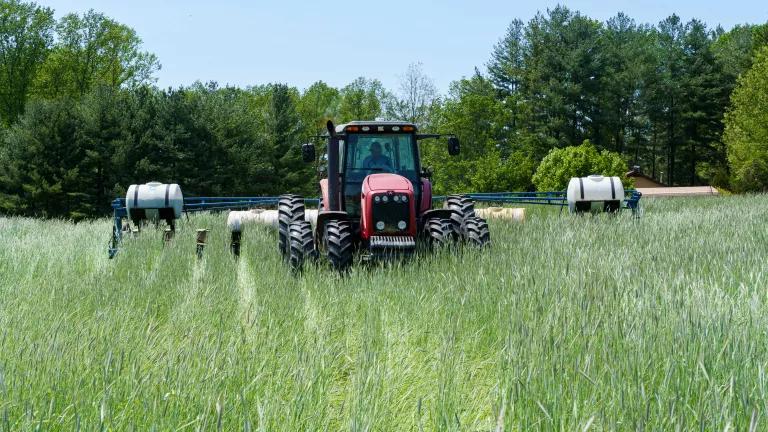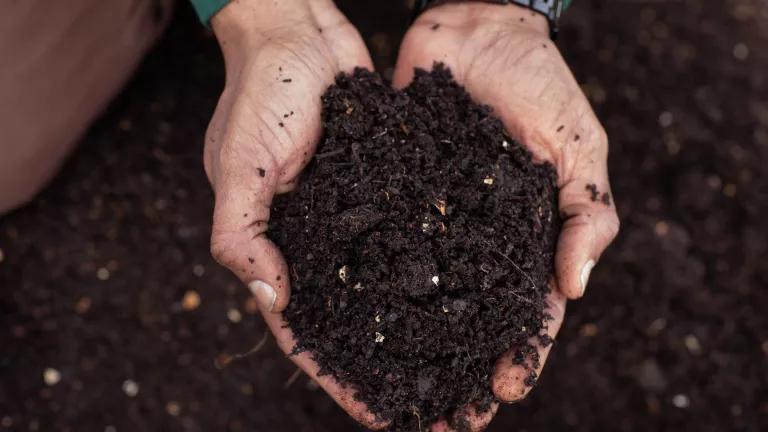150 Organizations Unite for a Transformative Farm Bill
NRDC joined more than 150 organizations united for a transformative, values-oriented Farm Bill.

Jathan Boscoe (right) and Tomika Bell, a grant writer for Choctaw Fresh Produce, loading boxes of organic vegetables into a truck for distribution in Choctaw, Mississippi
Every five years, Congress reauthorizes the Farm Bill, a wide-ranging piece of legislation that affects every part of our food system. The 2018 Farm Bill authorized nearly $430 billion in public spending, including funding for programs that support on-farm conservation and resource protection, organic agriculture, food waste reduction, and underserved farmers, as well as the Supplemental Nutrition Assistance Program (SNAP) that combats food insecurity and puts meals on the table for millions of people across the United States.
The next Farm Bill will be pivotal for the nation’s food and farm systems, which have been shocked and tested by the succession of climate change; a global pandemic; supply chain disruptions; significant inflation; and the ripple effects of Russia’s invasion of Ukraine, a major producer of grains and oil seeds. Those recent and ongoing crises have also highlighted the role of public policies and investments in supporting the food and farm system. Farm Bill investments should should avoid transfers of wealth from the many to the few, overpayment without regard to environmental outcome, moral hazard, exploitation of workers, and the sanctioning of practices that pollute and degrade the environment. With the reauthorization of the Farm Bill fast approaching, we can’t miss the opportunity to advance a transformative, values-oriented Farm Bill that dramatically improves the policies and federal resources that shape the U.S. food and farm system.
That’s why today NRDC joined more than 150 organizations united for a transformative, values-oriented Farm Bill to send a letter to President Biden and U.S. Department of Agriculture Secretary Tom Vilsack. The letter asks that the President commit to a Farm Bill that reflects his values and builds on the administration’s actions to date to reduce economic inequality; bridge the nation’s racial divides; end hunger; confront the climate crisis; improve nutrition and food safety; and protect farmers, workers and communities. The letter is pasted below.
September 13, 2022
Re: Demand a Farm Bill that Reflects Your Values
Dear Mr. President:
Every five years, Congress reauthorizes the Farm Bill, a wide-ranging piece of legislation that affects every part of our food system. The next Farm Bill should reflect your values and build on your administration’s actions to date to reduce economic inequality; bridge the nation’s racial divides; end hunger; confront the climate crisis; improve nutrition and food safety; and protect and support farmers, workers, and communities. Such a Farm Bill should:
Center Racial Justice – To reflect your values, the next Farm Bill must advance your administration’s pledge to “confront the hard reality of past discrimination” and address the continuing and devastating reality of systemic racism in the U.S. Department of Agriculture. Your Farm Bill must be a racial justice bill that will, in the words of your 2021 Executive Order, “allocate resources to address the historic failure to invest sufficiently, justly, and equally in underserved communities.” Farmers and communities of color, Tribal Nations, and food and farm workers add immeasurable knowledge and value to our food and farm system and make essential economic and environmental contributions. Ultimately, equity and justice must be at the center of every facet of the next Farm Bill if we hope to repair historical and ongoing discrimination against these communities, recognize more fully their contribution to the food and farming system, and eliminate inequities throughout the food and farm economy.
End Hunger – As you have recognized, “too many families do not know where they’re going to get their next meal.” To reflect your values, the next Farm Bill must protect and strengthen food assistance programs to ensure sufficient resources, merit staffing, and access to nutritious food for all people who struggle against hunger and food insecurity as a result of wealth and income inequities often driven by systemic racism.
Meet the Climate Crisis Head On – To reflect your values, the next Farm Bill must also be a climate bill. We will not avoid the worst effects of climate change unless this nation reduces heat-trapping emissions, including from agriculture. Your Farm Bill must invest in research, technical assistance, and financial incentives to enable farmers and ranchers to reduce emissions and to implement farming practices and labor policies that make their farms and workers better able to withstand extreme weather. The next Farm Bill should reward farmers and ranchers who are already implementing such practices while also enabling others to make those shifts and discouraging farming practices that are harmful to the environment and public health.
Increase Access to Nutritious Food – As you have noted, there are “too many empty chairs around the kitchen table because a loved one was taken by heart disease, diabetes, or other diet-oriented diseases,” and related health care costs continue to grow. Poor nutrition is now the leading cause of U.S. deaths—surpassing smoking—and racial inequities in our society frequently leave communities of color without access to nutritious foods. To reflect your values, the next Farm Bill must tackle this crisis by improving nutrition security, which your administration has defined as “consistent and equitable access to healthy, safe, affordable foods essential to optimal health and well-being” for all.
Ensure Safety and Dignity for Food and Farm Workers – The COVID-19 pandemic revealed the vulnerability of the 20 million food and farm workers declared essential to feeding our nation. To reflect your values, the next Farm Bill must invest substantially in the people who plant, harvest, process, transport, sell and serve our food, and administer our food programs, ensuring safety and a living wage along with access to health care, clean housing, and the right to organize and join a union. The next Farm Bill must protect food and farm workers from pesticides and extreme heat and strengthen the consequences for employers that endanger their workers. Also needed are new avenues to support the aspirations of farmworkers who wish to become farmers and access to citizenship for workers in the U.S. food chain that does not tie them to exploitative labor practices and systems.
Protect Farmers and Consumers – As you have said, “capitalism without competition isn’t capitalism; it’s exploitation.” You have made competition in the U.S. economy a priority of your administration, and your Farm Bill can and must build on your efforts to promote competition in the food and agriculture sectors. Anti-competitive practices are harming small-scale farmers, workers and consumers; hollowing out rural communities; and damaging our environment. Your Farm Bill should acknowledge those forms of damage as central criteria in defining anti-competitive food and agriculture marketplaces, while increasing long-term investments in local and regional food processing and distribution. In that way, the Farm Bill can level the playing field for farmers and offer more and better choices to consumers.
Ensure the Safety of Our Food Supply – Thousands of people in our country die every year from foodborne illness, and millions more are sickened by pathogens in meat, poultry, produce and drinking water. Recent food safety failures have highlighted gaps in our food safety net that place consumers at unacceptable risks from pathogens. Your Farm Bill must do more to address pathogens that originate on factory farms and make the U.S. food supply safe for everyone.
President Biden, the undersigned organizations call on you to demand a transformative Farm Bill that fully reflects those values and that you can be proud to sign.
CC: The Honorable Tom Vilsack
A copy of this letter with a list of all organizations that signed can be found here.





